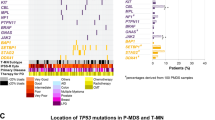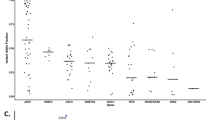Abstract
The molecular mechanisms underlying the development and evolution of myelodysplastic syndrome (MDS) are largely unknown. The increasing number of blast cells in the bone marrow correlate with poor prognosis and risk of developing acute leukemia. Such progression is frequently associated with increasing chromosomal abnormalities and genetic mutations. A cohort of 75 MDS patients were investigated for RAS, FMS and p53 mutations, and these molecular findings were related to cytogenetics, clinical status, transformation to acute leukemia, prognostic scores and survival. A mutation incidence of 57% (43/75) was found, with 48% (36/75) RAS mutations, 12% (9/75) FMS mutations and 8% (4/50) p53 mutations. The mutation status for RAS and FMS was related to MDS subgroup, increasing with poor-risk disease. The highest incidence was in the chronic myelomonocytic leukemia (CMML) subgroup. The most frequent RAS mutations were of codon 12 and a predominance of FMS codon 969 mutations was observed. A statistically significant increased frequency of transformation to AML was observed in MDS patients harboring RAS or FMS mutations (P < 0.02). patients with oncogene mutations had a significantly poorer survival compared with those without mutations at 2 years and at the end of the period of follow-up (P < 0.02). multivariate analysis including mutation, age, gender, diagnosis (fab), cytogenetics and international score shows that the international score and mutation and age is the best predictive model of a poor outcome, (P <0.0001). when the analysis was undertaken without the international score, mutation and gender was the best predictor of poor survival (P = 0.005). This study shows that oncogene mutation, indicative of genetic instability, is associated with disease progression and poor survival in MDS.
This is a preview of subscription content, access via your institution
Access options
Subscribe to this journal
Receive 12 print issues and online access
$259.00 per year
only $21.58 per issue
Buy this article
- Purchase on Springer Link
- Instant access to full article PDF
Prices may be subject to local taxes which are calculated during checkout
Similar content being viewed by others
Author information
Authors and Affiliations
Rights and permissions
About this article
Cite this article
Padua, R., Guinn, BA., Al-Sabah, A. et al. RAS, FMS and p53 mutations and poor clinical outcome in myelodysplasias: a 10-year follow-up. Leukemia 12, 887–892 (1998). https://doi.org/10.1038/sj.leu.2401044
Received:
Accepted:
Published:
Issue Date:
DOI: https://doi.org/10.1038/sj.leu.2401044
Keywords
This article is cited by
-
Relationship between p53 expression and prognosis of myelodysplastic syndrome treated with azacitidine
Journal of Hematopathology (2020)
-
SIVA, a target of p53, is downregulated in myelodysplastic syndromes
Applied Cancer Research (2017)
-
GEP analysis validates high risk MDS and acute myeloid leukemia post MDS mice models and highlights novel dysregulated pathways
Journal of Hematology & Oncology (2016)
-
Prevalence, clonal dynamics and clinical impact of TP53 mutations in patients with myelodysplastic syndrome with isolated deletion (5q) treated with lenalidomide: results from a prospective multicenter study of the german MDS study group (GMDS)
Leukemia (2016)
-
Molecular pathogenesis of atypical CML, CMML and MDS/MPN-unclassifiable
International Journal of Hematology (2015)



